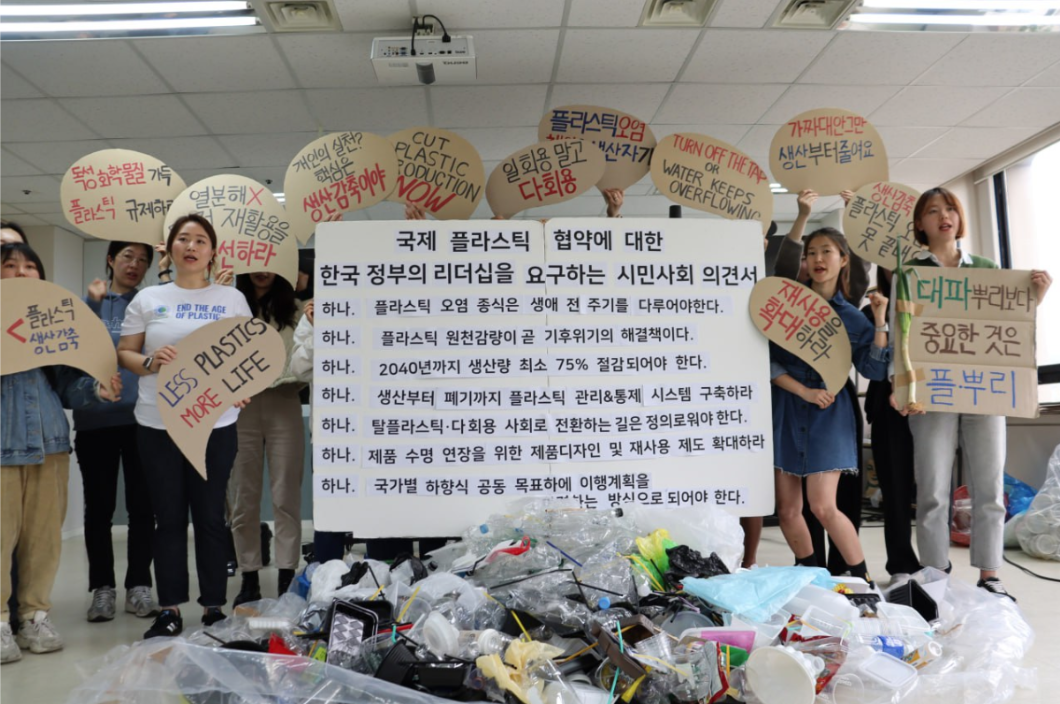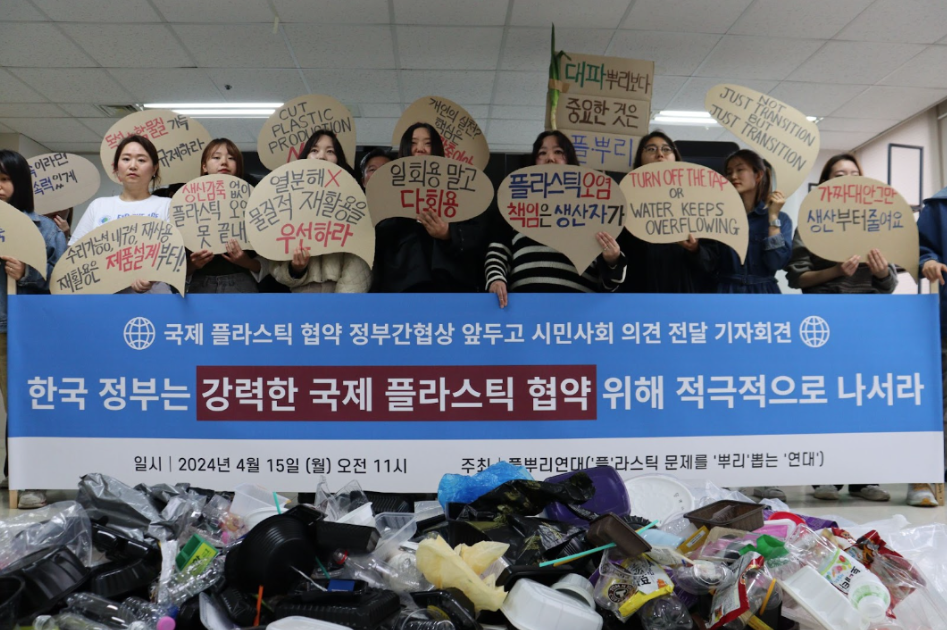On April 15, Uproot Plastics, comprised of 15 domestic and international civic groups in the Republic of Korea, presented civil society's viewpoints ahead of the 4th Intergovernmental Negotiation Committee (INC) of the ‘The International Legally Binding Instrument on Plastic Pollution, including in the Marine Environment (hereafter ‘Global Plastics Treaty’)’. A press conference was convened to convey the 'Civil Society’s call for the Korean Government’s strong ambition in the Global Plastics Treaty' to the relevant ministries. Korea serves as the host country for the 5th Intergovernmental Negotiation Committee and holds early membership in the High Ambition Coalition to End Plastic Pollution (HAC). Further, Korea ranks as the world's fourth-largest producer of synthetic resins. However, concerns have been raised regarding Korea's negotiation focus, which primarily emphasizes downstream aspects of the plastic lifecycle such as waste management, recycling, and plastic substitutes. This approach has drawn scrutiny from academia and civil society advocates who support a more comprehensive and stronger instrument.
In response, Uproot Plastics drafted written statements consolidating the key viewpoints of member organizations, and the summary has been released in the press conference statement. The main points highlighted are as follows:
- Addressing plastic pollution requires tackling the entire plastic lifecycle
- Mitigating plastic sources is pivotal in addressing the climate crisis
- A robust agreement should commit to reducing plastic production by at least 75% by 2040
- Establishing a comprehensive plastic management and control system from production to disposal is imperative
- Promoting product design and reuse systems to prolong product lifespan is essential
- The transition to a plastic-free and reusable society must be equitable
- Effective implementation of the Global Plastics Convention necessitates country-specific plans aligned with overarching objectives
During the press conference, each organization highlighted its main points. Greenpeace Korea's Plastic Campaigner, KIM Nara, presented findings from a recent awareness survey conducted by Greenpeace involving 19,000 citizens across 19 countries, including Korea. She stated, "Eight out of ten citizens worldwide are concerned about plastic pollution," highlighting the prevalent global awareness of the issue. "Respondents emphasized the necessity of reducing production to address the problem," she continued. Kim noted that 71.8% of Korean respondents supported banning single-use plastic packaging. "We require a robust global plastics treaty that aligns with the high hopes of the populace," she stressed. In this context, a "strong agreement" refers to one that encompasses the entire lifecycle of plastics, commencing from the extraction of raw materials for plastic production.
YU Hyein, an activist from the Korea Federation for Environmental Movements, voiced concerns regarding the government's stance, particularly on behalf of Korean industries adopting a cautious approach to new plastic production. Yu emphasized that the approach should extend beyond disposal, advocating for reduction and reusable design starting from the production phase. She proposed setting a target for product packaging reuse, akin to the 10% target specified in the EU packaging material regulations. Yu further urged the Korean government to establish a reuse target and present a concrete roadmap, develop design standards considering product recyclability, and expand the reuse system to facilitate a transition towards a circular economy.
MOON Doun, a policy and research officer at Global Alliance for Incinerator Alternatives(GAIA), highlighted the challenges in commercializing the so-called chemical “recycling” process of converting waste plastic into a plastic precursor, citing a pro-industry consulting firm McKinsey's evaluation of the current contribution of chemical recycling as close to 0%. Further, even with an investment of approximately KRW 50 trillion (USD 40 billion) by 2030, the amount of recycled plastic supplied through chemical recycling would only range from 4 to 8%. In light of these findings, emphasis was placed on directing investments towards proven solutions, such as reducing production, establishing reuse and refill systems, and prioritizing mechanical recycling.
SON Serah, a researcher at Reloop, an international research center focusing on circular and social economy based in Belgium, emphasized the necessity of establishing measurable goals in combating plastic pollution. Son highlighted that vague objectives, such as reducing environmental exposure to plastic by certain percentage by 2040, are challenging to assess and urged for the refinement of goals to target specific types, categories, and uses of plastics. She also stressed the importance of establishing a common global standard to measure the attainment of these goals. Moreover, she expressed the hope for global collaboration in implementing effective measures to eradicate plastic pollution, alongside providing support to developing countries in this endeavor.
KIM Poyeon, lead of the International Cooperation at the Wonjin Institute for Occupational and Environmental Health, underscored the urgency of international solidarity in safeguarding human health and the environment. Kim highlighted that approximately 16,000 hazardous chemicals are utilized in plastic manufacturing, leading to diverse adverse effects on both human health and the environment. She emphasized the critical need for robust and holistic international plastic regulations to address this issue comprehensively. In particular, it was stressed that addressing the pervasive presence of harmful plastic substances, which infiltrate various aspects of daily life and accumulate in the human body, requires solutions to tackle issues stemming from the lack of transparency in information and insufficient data on harmfulness. Furthermore, she warned about the risks associated with chemical recycling and advocated for heightened awareness of these potential hazards.
LEE Yuna, the International Cooperation Team Manager at OSEAN (Our Sea of East Asia Network), a non-profit, independent research institute specializing in marine litter, emphasized the critical importance of the ongoing agreement, noting that 80% of marine litter comprises plastic. She stressed that all countries must take proactive measures under binding responsibilities to achieve their goals effectively. Further, it was highlighted that the current negotiations primarily focus on managing fishing gear waste that has already been generated. However, for more efficient regulation, it was suggested that management should encompass the entire life cycle of fishing gear, including design, production, distribution, use, and disposal.
Activist YU Sammy from the Green Society Team of Green Korea United stressed the importance of tailoring discussions to the specific context of Korea in transitioning towards a plastic-free society. Given that Korea's plastics industry is predominantly comprised of small and medium-sized enterprises and is labor-intensive, any efforts to reduce production and adopt a reuse system are likely to impact workers in the industry. Yu highlighted the potential for increased social costs and unnecessary conflicts if adequate measures are not taken. To mitigate these risks, Yu suggested drawing lessons from overseas examples, such as Germany's transition away from coal and recommended preparing various measures to ensure that the burden is not shifted to workers in existing industries. It was emphasized that representatives should advocate for the interests of workers appropriately during negotiations.
Activists from various units of Uproot Plastics concluded the press conference with a poignant demonstration. They took turns expressing their concerns to the government by symbolically addressing the plastic waste piled up on the floor.
The Global Plastics Treaty is considered the most significant international environmental and climate accord since the Paris Agreement. The international community recognizes the environmental pollution and health risks stemming from the excessive use of plastics, leading to a resolution passed at the 5.2nd United Nations Environment Assembly (UNEA) in February 2022. Since its adoption, a series of five scheduled Intergovernmental Negotiating Committees (INCs) have been underway. Following the 4th INC held in Ottawa, Canada at the end of April, the 5th round of intergovernmental negotiations is scheduled to take place in Busan, Korea's second most populous city after Seoul, from November 25 to December 1.
Uproot Plastics is a coalition of Korean civil society organizations aimed at advocating for the establishment and enforcement of a robust and impactful Global Plastics Treaty. The coalition includes prominent organizations such as Action for a Carcinogen-free Korea, Almang Market, Break Free From Plastic (BFFP), Climate Change Center (CCC), Global Alliance for Incinerator Alternatives (GAIA), Green Korea United (GKU), Greenpeace Korea, Korea Federation for Environmental Movements (KFEM), Korea Zerowaste Movement Network, Korean Women's Environmental Network (KWEN), Our Sea of East Asia Network (OSEAN), RELOOP, Resource Circulation Society & Economy Institute, Seoul Korea Federation for Environmental Movements (Seoul KFEM), and Wonjin Institute for Occupational and Environmental Health (WIOEH). Uproot Plastics pledges to engage in various activities, including hosting a forum titled “Prospects and Challenges of the Global Plastic Treaty: How to Respond” on April 9th, to advocate for a robust Global Plastic Treaty and to support Korea’s strong ambition throughout the process.

Uproot Plastics on April 15, 2024: Action for a Carcinogen-free Korea, Almang Market, Break Free From Plastic (BFFP), Climate Change Center (CCC), Global Alliance for Incinerator Alternatives (GAIA), Green Korea United (GKU), Greenpeace Korea, Korea Federation for Environmental Movements (KFEM), Korea Zerowaste Movement Network, Korean Women's Environmental Network (KWEN), Our Sea of East Asia Network (OSEAN), RELOOP, Resource Circulation Society & Economy Institute, Seoul Korea Federation for Environmental Movements (Seoul KFEM), and Wonjin Institute for Occupational and Environmental Health (WIOEH)
###
Press Conference Snapshotsㅣ2024.04.15
A Compilation of Letters to Korean Gov. (in Korean)ㅣ2024.04.15
Press Contact:
LEE Yuna (Ms.), Int’l Coop Team Manager, OSEAN (Our Sea of East Asia Network): yunalee@osean.net / +82-10-3165-4580




